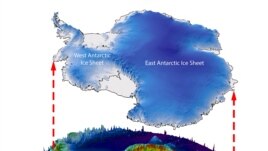05 November 2023
Antarctica has not always been a land of ice and snow. Earth's southernmost continent once was home to rivers and forests full of life.
Scientists are using satellite observations and radar imagery to look deep under the ice. The researchers report finding a large ancient landscape buried under the continent's ice sheet. It is full of valleys and ridges, shaped by rivers before being covered by glaciers long ago.
The landscape is located in East Antarctica's Wilkes Land area bordering the Indian Ocean. It covers an area about the size of Belgium. The researchers said the landscape appears to date to at least 14 million years ago and perhaps beyond 34 million years ago, when Antarctica entered its deep freeze.

An illustration shows how a landscape the size of Belgium located in Wilkes Land, East Antarctica would appear if the thick ice sheet covering it were lifted away. (Stewart Jamieson, Durham University/Handout via REUTERS)
"The landscape is like a snapshot of the past," said Stewart Jamieson. He is a professor of glaciology at Durham University in England and co-leader of the study published in the journal Nature Communications.
"It is difficult to know what this lost world might have looked like before the ice came along, but it was certainly warmer back then," Jamieson added. "Depending how far back in time you go, you might have had climates that ranged anywhere from the climate of present-day Patagonia through to something more approaching tropical."
Such an environment likely would have been populated by wildlife, Jamieson said. But the area's fossil record is too incomplete to know which animals may have lived there.
The ice above the ancient landscape measures about 2.2 kilometers to 3 kilometers thick, said study co-leader Neil Ross. He is a professor of polar science and environmental geophysics at Newcastle University in England.
The researchers said the surface of the planet Mars is better known than the earth surface below the ice in Antarctica. They said one way to learn more would be to drill through the ice and take a piece of the earth below. This could uncover evidence showing ancient life, as was done with samples taken in Greenland dating back two million years ago.
Some earlier studies have uncovered ancient landscapes beneath Antarctica's ice including mountains. But the landscape discovered in the new study was the first of its kind.
Right before 34 million years ago, Antarctica's landscape and wildlife was likely similar to today's cold temperate rainforests. That includes places like Tasmania, New Zealand and South America's Patagonia area, Ross added.
Antarctica was once part of the Gondwana supercontinent that also included what is now Africa, South America, Australia, the Indian subcontinent and the Arabian Peninsula. But it eventually split off in a process called plate tectonics.
Jamieson said the researchers think that when Antarctica's climate was warmer, rivers flowed toward a continental coastline that was created as the other land masses broke away. When the climate cooled, he said, some small glaciers formed on hills next to the rivers, with valleys deepening as glaciers eroded.
When the climate cooled even more, an ice sheet grew which covered the whole continent, Jamieson added. Eventually, "the landscape got preserved, likely for 34 million years."
I'm Dan Novak.
Dan Novak adapted this story for VOA Learning English based on reporting by Reuters.
_____________________________________________
Words in This Story
landscape — n. an area of land that has a particular quality or appearance
ridge — n. a long area of land that is on top of a mountain or hill
snapshot — n. a quick view or a small amount of information that tells you a little about what someone or something is like
range — n. a group or collection of different things or people that are usually similar in some way
tropical — adj. of, relating to, occurring in, or used in the tropics
erode — v. to gradually destroy or to be gradually destroyed by natural forces